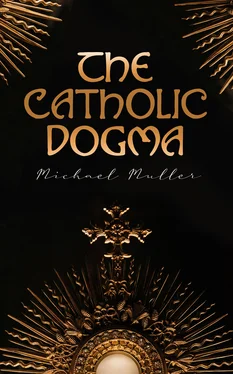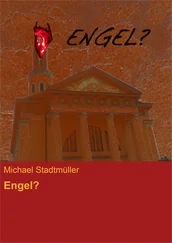Michael Müller - The Catholic Dogma
Здесь есть возможность читать онлайн «Michael Müller - The Catholic Dogma» — ознакомительный отрывок электронной книги совершенно бесплатно, а после прочтения отрывка купить полную версию. В некоторых случаях можно слушать аудио, скачать через торрент в формате fb2 и присутствует краткое содержание. Жанр: unrecognised, на английском языке. Описание произведения, (предисловие) а так же отзывы посетителей доступны на портале библиотеки ЛибКат.
- Название:The Catholic Dogma
- Автор:
- Жанр:
- Год:неизвестен
- ISBN:нет данных
- Рейтинг книги:4 / 5. Голосов: 1
-
Избранное:Добавить в избранное
- Отзывы:
-
Ваша оценка:
- 80
- 1
- 2
- 3
- 4
- 5
The Catholic Dogma: краткое содержание, описание и аннотация
Предлагаем к чтению аннотацию, описание, краткое содержание или предисловие (зависит от того, что написал сам автор книги «The Catholic Dogma»). Если вы не нашли необходимую информацию о книге — напишите в комментариях, мы постараемся отыскать её.
The Catholic Dogma — читать онлайн ознакомительный отрывок
Ниже представлен текст книги, разбитый по страницам. Система сохранения места последней прочитанной страницы, позволяет с удобством читать онлайн бесплатно книгу «The Catholic Dogma», без необходимости каждый раз заново искать на чём Вы остановились. Поставьте закладку, и сможете в любой момент перейти на страницу, на которой закончили чтение.
Интервал:
Закладка:
"That faith," says the same great Doctor of the Church , "is sound, by which we believe that neither any adult nor infant could be delivered from sin and the death of the soul, except by Jesus Christ, the only Mediator between God and man." ( Ep. 190, olim 157, parum a principio.) Hence St. Thomas says: Almighty God decreed from all eternity the mystery of the Incarnation, in order that men might obtain salvation through Christ. It was therefore necessary at all times, that this mystery of the Incarnation should, in some manner, be explicitly believed. Undoubtedly, that means is necessarily a truth of faith, by which man obtains salvation. Now men obtain salvation by the mystery of the Incarnation and Passion of Christ; for it is said in the Holy Scripture: "There is no other name under heaven given to men whereby we must be saved." (Acts, iv. 10.) Hence it was necessary at all times that the mystery of the Incarnation of Christ should be believed by all men in some manner (aliqualiter, either implicitly or explicitly), however, in a different way, according to the circumstances, of times and persons.
Before the fall, man believed explicitly the Incarnation of Christ. Ante statum peccati homo habuit explicitam fidem de Christi incarnatione, secundum quod ordinabatur ad consummationem gloriae, non autem secundum quod ordinabatur ad liberationem a peccato per passionem et resurrectionem, quia homo non fuit praescius peccati futuri. But that he had the knowledge of Christ’s Incarnation seems to follow from his words: "Wherefore a man shall leave father and mother, and shall cleave to his wife." (Gen. 11. 24) And St. Paul calls this a great sacrament in Christ and in the Church; (Eph. v. 32.) and therefore it cannot be believed that the first man was ignorant of this sacrament.
After the fall of man, the mystery of the Incarnation of Christ was explicitly believed, that is, not only, the Incarnation itself, but also the Passion and Resurrection of Christ, by which mankind is delivered from sin and death; for otherwise they could not have prefigured Christ's Passion by certain sacrifices offered as well before as also after the Written Law, the meaning of which sacrifices was well known to those whose duty it was to teach the religion of God; but as to the rest of the people, who believed that those sacrifices were ordained by God to foreshadow Christ to come, they had thus implicit faith in Christ.
As the mystery of the Incarnation was believed from the beginning, so, also, was it necessary to believe the mystery of the Most Holy Trinity; for the mystery of the Incarnation cannot be explicitly believed without faith in the Most Holy Trinity, because the mystery of the Incarnation teaches that the Son of God took to himself a human body and soul by the power of the Holy Ghost. Hence, as the mystery of the Incarnation was explicitly believed by the teachers of religion, and implicitly by the rest of the people, so, also, was the mystery of the Most Holy Trinity explicitly believed by the teachers of religion and implicitly by the rest of the people. But in the New Law it must be explicitly believed by all." (De Fide, Q ii., art. vii. et viii.)
God revealed these great truths of salvation to our first parents immediately after the fall. He preserved the knowledge of them through the holy patriarchs and prophets who, in clear language, foretold that the Redeemer would come, and "be a priest upon his throne" (Zach. vi. 13.), "a priest according to the order of Melchisedech," (Ps. cix. 4.), and that he himself would be the victim offered up for the sins of mankind.
From these great, fundamental truths of religion we easily understand why St. Paul wrote to the Hebrews: "Jesus Christ yesterday, and to-day, and the same forever" (Heb. xiii. 8.), "through whom it hath well pleased the Father to reconcile all things unto himself, making peace through the blood of the cross, both as to the things on earth and the things that are in heaven." (Coloss. i. 20.)
The great apostle means to say: O Hebrews, Jesus Christ, the God-Man and High Priests, was yesterday, that is, he was in the time before you from the beginning. Jesus was the victim and priest before the Law, not in person, but in figure. He was the victim in figure in the lamb and other animals which priests and patriarchs offered in sacrifices. The faithful worshippers saw Christ in those sacrifices either explicitly or implicitly; and they believed in him. They believed that he would come and redeem the world. By this spiritual knowledge they guided their lives: Thus their sins were forgiven both as to their guilt and their punishment. The sacrifice of Abel was acceptable to God, because in the lamb which he sacrificed he saw not merely the lamb, but also a better victim - that is, the Saviour, and he believed in him, and therefore God had regard to Abel and his offering; and "God the Father," says St. Augustine, " reconciles to himself, through Christ, the things on earth, and the things in heaven, by offering pardon to all men, on account of Christ, and by giving those who make themselves worthy of it the seats of glory which the fallen angels have lost." (See Cornel. a Lap., Epist. ad Ephes., c. i., from v. 1–10.)
We also learn from Christ and his Church, that the explicit faith in the mysteries of the Holy Trinity and of the Incarnation of the Son of God is also required as a necessary means of salvation.
"This is life everlasting," says our Saviour, "that they may know thee, the only true God, and Jesus Christ whom thou hast sent; " (John, xvii. 3.), for, says he, "I am the way, and the truth, and the life," that lead man to the Father. Hence "no man cometh to the Father but by me." John, xiv.6.)
But if a man act according to the dictates of his conscience, and follow exactly the light of reason which God has implanted in him for his guide, is that not sufficient to bring him to salvation?
"This is, indeed," says Bishop Hay, "a specious proposition; but a fallacy lurks under it. When man was created, his reason was then an enlightened reason. Illuminated by the grace of original righteousness, with which his soul was adorned, reason and conscience were safe guides to conduct him in the way of salvation. But by sin this light was miserably darkened, and his reason clouded by ignorance and error. It was not, indeed, entirely extinguished; it still clearly teaches him many great truths, but it is at present so influenced by pride, passion, prejudice, and other such corrupt motives, that in many instances it serves only to confirm him in error, by giving an appearance of reason to the suggestions of self-love and passion. This is too commonly the case, even in natural things; but in the supernatural, in things relating to God and eternity, our reason, if left to itself, is miserably blind. To remedy this, God has given us the light of faith as a sure and safe guide to conduct us to salvation, appointing his holy Church the guardian and depository of this heavenly light; consequently, though a man may pretend to act according to reason and conscience, and even flatter himself that he does so, yet reason and conscience, if not enlightened and guided by true faith, can never bring him to salvation.
"Nothing can be more striking than the words of Holy Scripture on this subject. ‘There is a way,' says the wise man, ‘that seemeth right to a man, but the ends thereof lead to death.' (Prov. xiv. 10.) What can be more plain than this, to show that a man may act according to what he thinks the light of reason and conscience, persuaded he is doing right, and yet, in fact, he is only running on in the way to perdition! And dot not all those who are seduced by false prophets, and false teachers, think they are in the right way? Is it not under the pretext of acting according to conscience that they are seduced? and yet the mouth of truth itself has declared, that 'if the blind lead the blind; both shall fall into the pit.' (Mat. xv. 14.) In order to show us to what excess of wickedness man may go under the pretence of following his conscience, the same Eternal Truth says to his apostles, ' the hour cometh, that whosoever killeth you will think that he doth God a service;' (John xvi. 2.) but observe what he adds, - 'And these things will they do because they have not known the Father nor me.' (Ib. 3.) Which shows that, if one has not the true knowledge of God and of Jesus Christ, which can be obtained only through true faith in the Church, there is no enormity of which he is not capable while thinking he is acting according to reason and conscience. Had we only the light of reason to direct us, we would be justified in following it; but as God has given us an external guide in his holy Church, to assist and correct our blinded reason by the light of faith; our reason alone, unassisted by this guide, can never be sufficient for salvation.
Читать дальшеИнтервал:
Закладка:
Похожие книги на «The Catholic Dogma»
Представляем Вашему вниманию похожие книги на «The Catholic Dogma» списком для выбора. Мы отобрали схожую по названию и смыслу литературу в надежде предоставить читателям больше вариантов отыскать новые, интересные, ещё непрочитанные произведения.
Обсуждение, отзывы о книге «The Catholic Dogma» и просто собственные мнения читателей. Оставьте ваши комментарии, напишите, что Вы думаете о произведении, его смысле или главных героях. Укажите что конкретно понравилось, а что нет, и почему Вы так считаете.












